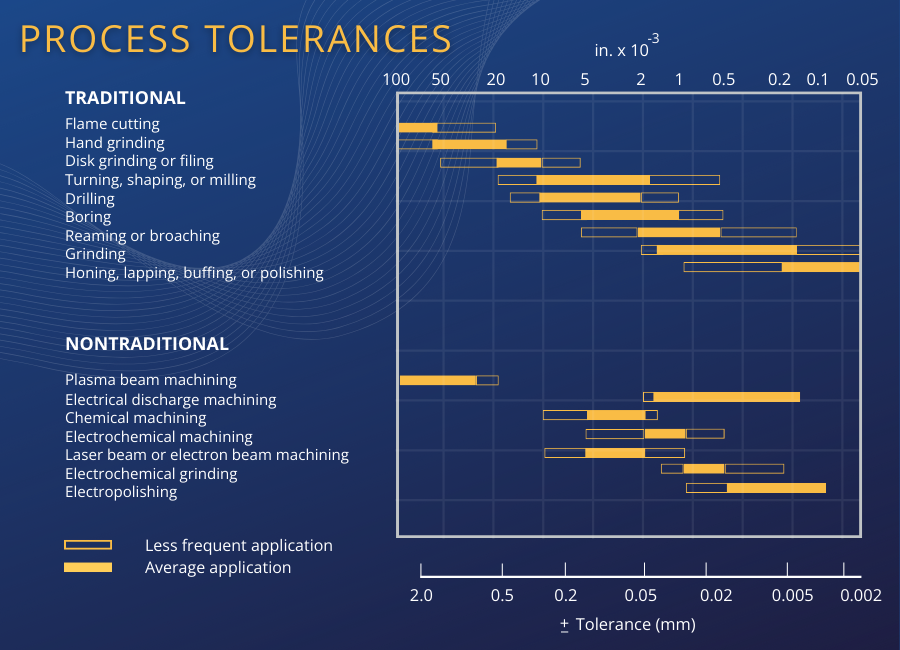Tel: 860-571-3602 | info@hartfordtechnologies.com


In the world of precision manufacturing, tolerance levels are more than just technical details. They are the foundation of quality and reliability. Every component, no matter how small, plays a crucial role in the overall functionality and safety of the final product.
Tolerance levels determine the acceptable limits for manufacturing each part to ensure a proper fit and function. The precision of these tolerances can make or break the performance of a machine.
In this article, we simplify the concept of tolerance levels in precision manufacturing and emphasize the significant factors they can influence. These factors encompass a product's functionality, longevity, safety, and a company's overall reputation.
 Knowing Tolerance Levels as a Product Manager or Engineer
Knowing Tolerance Levels as a Product Manager or EngineerFor product managers and engineers, a deep understanding of tolerance levels is vital. It's not just about meeting specifications; it's about understanding the impact of tolerances on performance, manufacturing, and customer satisfaction.
Engineers must design with tolerances in mind, ensuring components meet individual specs and work together seamlessly. Product managers must oversee manufacturing to consistently produce parts within critical limits.
Tolerance levels are the language of precision in manufacturing. They guide the transition from design to reality, ensuring that what is planned is achieved with equal precision. Understanding tolerance levels is not only necessary, but it's also a strategic tool that empowers product managers and engineers to innovate and excel in precision manufacturing's competitive field.
These standards not only impact but also influence component wear and tear, ease of assembly, and product lifecycle. Mastery of manufacturing tolerances sets industry leaders apart in precision-driven industries. It requires a delicate balance between engineering precision and practical manufacturability, showcasing top-tier manufacturing prowess.
.png?width=809&height=1052&name=HT%20%20Process%20tolerance%20vs.%20feature%20size%20(1).png)
Manufacturing tolerance is imperative to ensure proper functioning, smooth operation, and adherence to performance standards of parts or components. These tolerances define acceptable limits for variation in physical dimensions or measurements. Precision manufacturing requires minimizing errors and making tolerances essential for success, safety, and reliability.
Tolerance standards vary across industries, each with unique requirements and challenges. These standards not only impact product quality and performance but also reflect technological advancements and precision capabilities.
Let's explore how tolerance standards are applied in some of the following industries:
Strict adherence to tolerances is critical in the aerospace industry. Even the smallest difference in turbine blade dimensions can lead to imbalances, excessive vibration, inefficient fuel consumption, or engine failure. Maintaining these stringent tolerances ensures performance and prioritizes passenger and crew safety.
In the automotive industry, tolerance levels assume significant importance. The engine, being a complex assembly, relies on all its parts working harmoniously. Even a slight deviation in the size or shape of a piston can result in decreased engine efficiency, increased emissions, or complete engine failure.
Strict manufacturing tolerances are necessary to maintain reliability, and efficiency, and uphold a brand's reputation and customer trust.
The electronics industry demonstrates how tolerance standards have evolved with miniaturization and high-density packaging. Components like printed circuit boards (PCBs) and connectors require manufacturing tolerances measured in microns.
This precision ensures reliable electrical connections and fitment in compact spaces. Tight tolerances in electronic components also contribute to effective heat management, preventing overheating and device failure.
Material selection and tolerance play an integral role in manufacturing. Different materials have unique properties that affect their machinability and moldability. Understanding these characteristics is essential for setting realistic tolerance standards to ensure both manufacturability and functionality.
In sheet metal fabrication, materials like steel, aluminum, and copper are commonly used. Each material reacts differently to processes like bending, cutting, and welding. Tolerances can vary depending on the type of feature being formed.
In aluminum die casting, material properties significantly impact tolerance levels. Aluminum is lightweight and strong but presents challenges due to its thermal behavior and fluidity during casting. Precision is crucial for components that require accuracy, such as automotive parts.
Material selection not only influences achievable tolerances but also dictates manufacturing techniques and tools. It's a strategic decision that impacts the entire manufacturing process.
To find out about ball size, grade, and tolerance definitions from Hartford Technologies, visit here.
To achieve precision in manufacturing, advanced techniques like modular tooling and predictive maintenance are indispensable. Modular tooling allows for quick adjustments to meet different manufacturing requirements, while predictive maintenance helps prevent precision errors by predicting equipment failures.
Implementing tolerance standards effectively requires a comprehensive understanding of manufacturing capabilities and product requirements. Early integration, collaboration, and material awareness are essential for success. Despite advancements, there are inherent limitations and challenges to tolerance control.
Overcoming these obstacles involves using cutting-edge technologies, implementing rigorous quality control measures, and fostering a culture of continuous training. Understanding these limitations is key to establishing practical tolerance goals and achieving precision in manufacturing processes.
Mastering tolerance standards is essential for professionals to stay at the forefront of quality and innovation. At Hartford Technologies, we ensure that our products are traceable from raw materials and that our tolerance capabilities can go above and beyond. Our meticulous attention to detail ensures that your precision manufacturing requirements are not just met but surpassed with excellence.
Take advantage of our 97 years of expertise in cost-effective precision manufacturing, from ball bearings, pins, rollers, and more. If you are ready to experience the best, then get in touch with us now.